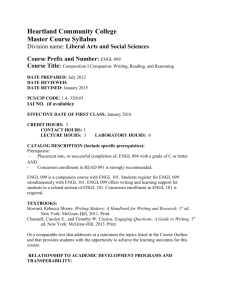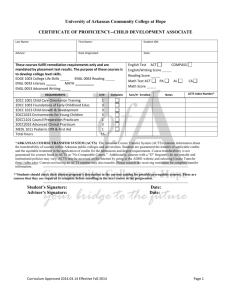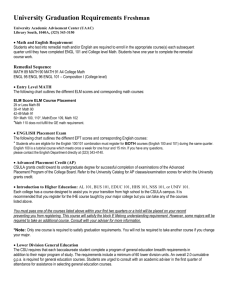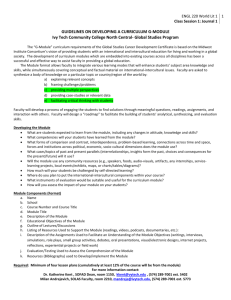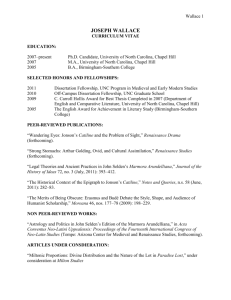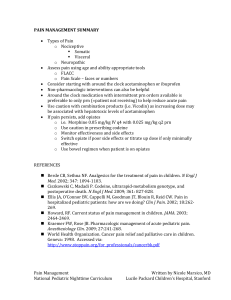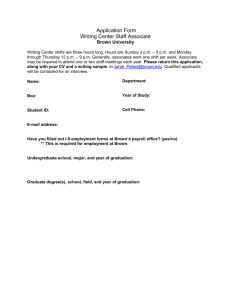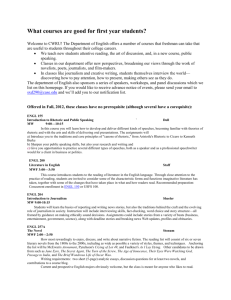Course Descriptions - California State University, Bakersfield
advertisement
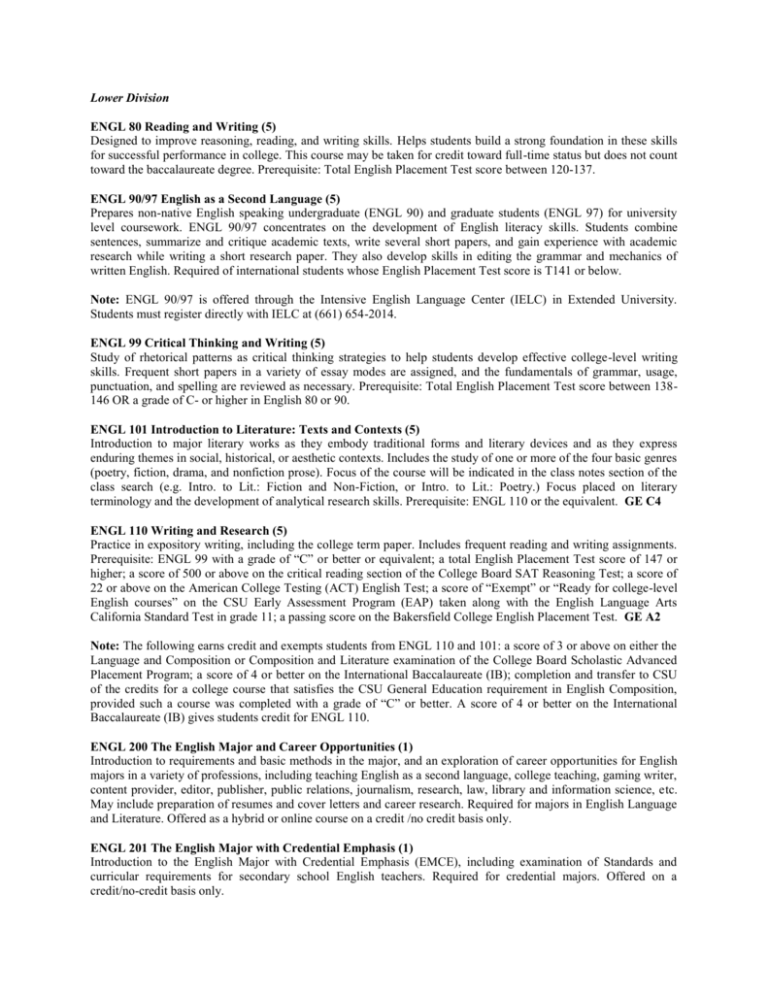
Lower Division ENGL 80 Reading and Writing (5) Designed to improve reasoning, reading, and writing skills. Helps students build a strong foundation in these skills for successful performance in college. This course may be taken for credit toward full-time status but does not count toward the baccalaureate degree. Prerequisite: Total English Placement Test score between 120-137. ENGL 90/97 English as a Second Language (5) Prepares non-native English speaking undergraduate (ENGL 90) and graduate students (ENGL 97) for university level coursework. ENGL 90/97 concentrates on the development of English literacy skills. Students combine sentences, summarize and critique academic texts, write several short papers, and gain experience with academic research while writing a short research paper. They also develop skills in editing the grammar and mechanics of written English. Required of international students whose English Placement Test score is T141 or below. Note: ENGL 90/97 is offered through the Intensive English Language Center (IELC) in Extended University. Students must register directly with IELC at (661) 654-2014. ENGL 99 Critical Thinking and Writing (5) Study of rhetorical patterns as critical thinking strategies to help students develop effective college-level writing skills. Frequent short papers in a variety of essay modes are assigned, and the fundamentals of grammar, usage, punctuation, and spelling are reviewed as necessary. Prerequisite: Total English Placement Test score between 138146 OR a grade of C- or higher in English 80 or 90. ENGL 101 Introduction to Literature: Texts and Contexts (5) Introduction to major literary works as they embody traditional forms and literary devices and as they express enduring themes in social, historical, or aesthetic contexts. Includes the study of one or more of the four basic genres (poetry, fiction, drama, and nonfiction prose). Focus of the course will be indicated in the class notes section of the class search (e.g. Intro. to Lit.: Fiction and Non-Fiction, or Intro. to Lit.: Poetry.) Focus placed on literary terminology and the development of analytical research skills. Prerequisite: ENGL 110 or the equivalent. GE C4 ENGL 110 Writing and Research (5) Practice in expository writing, including the college term paper. Includes frequent reading and writing assignments. Prerequisite: ENGL 99 with a grade of “C” or better or equivalent; a total English Placement Test score of 147 or higher; a score of 500 or above on the critical reading section of the College Board SAT Reasoning Test; a score of 22 or above on the American College Testing (ACT) English Test; a score of “Exempt” or “Ready for college-level English courses” on the CSU Early Assessment Program (EAP) taken along with the English Language Arts California Standard Test in grade 11; a passing score on the Bakersfield College English Placement Test. GE A2 Note: The following earns credit and exempts students from ENGL 110 and 101: a score of 3 or above on either the Language and Composition or Composition and Literature examination of the College Board Scholastic Advanced Placement Program; a score of 4 or better on the International Baccalaureate (IB); completion and transfer to CSU of the credits for a college course that satisfies the CSU General Education requirement in English Composition, provided such a course was completed with a grade of “C” or better. A score of 4 or better on the International Baccalaureate (IB) gives students credit for ENGL 110. ENGL 200 The English Major and Career Opportunities (1) Introduction to requirements and basic methods in the major, and an exploration of career opportunities for English majors in a variety of professions, including teaching English as a second language, college teaching, gaming writer, content provider, editor, publisher, public relations, journalism, research, law, library and information science, etc. May include preparation of resumes and cover letters and career research. Required for majors in English Language and Literature. Offered as a hybrid or online course on a credit /no credit basis only. ENGL 201 The English Major with Credential Emphasis (1) Introduction to the English Major with Credential Emphasis (EMCE), including examination of Standards and curricular requirements for secondary school English teachers. Required for credential majors. Offered on a credit/no-credit basis only. ENGL 204 American Literature Survey I (5) Survey of selected works of American literature from colonization to the Civil War, with particular emphasis on major figures and movements from the early and late colonial, early national, and romantic periods, including such subcategories as the literature of exploration, the Puritans, the American Enlightenment, and the American Renaissance. Prerequisite: ENGL 110 or the equivalent. GE C4 ENGL 205 American Literature Survey II (5) Survey of selected works of American literature from the Civil War to the present, tracing the development of American poetry, fiction, non-fiction, and drama, with particular emphasis on major figures and movements such as realism, naturalism, the literature of the Gilded Age, modernism, and postmodernism, including such sub-categories as regionalism, the literature of rural and urban landscape, transcontinental modernism, and the modern and postmodern avant-garde. Prerequisite: ENGL 110 or the equivalent. GE C4 ENGL 207 Ethnic-Minority American Literature (5) Introduction to a body of literature that is not often included in the traditional American literature curriculum. Major works of African-American, Asian-American, Native American, and Chicano literatures. Some study of the social and cultural contexts out of which this literature emerges will be included. Prerequisite: ENGL 110 or the equivalent. This is a writing intensive class. GE C4 ENGL 208 British Literature Survey I (5) Survey of major works and major writers from the Anglo-Saxon period to the Restoration. Prerequisite: ENGL 110 or the equivalent. GE C4 ENGL 209 British Literature Survey II (5) Survey of major works and major writers from the Restoration through the modern and contemporary era. Prerequisite: ENGL 110 or the equivalent. GE C4 ENGL 235 Shakespeare’s World (5) Introduction to the world in which Shakespeare lived and wrote. Using an interdisciplinary approach which brings together English literature, theatre, and media (video recordings of the plays), the class is designed to examine Renaissance England’s historical, social, artistic, literary, theatrical, moral, and ethical milieu through a detailed study/viewing of three selected plays. This is a writing intensive class. GE C4 ENGL 272 Introduction to Creative Writing (5) Introduction to the theory and practice of creative writing, including poetry, fiction, and non-fiction prose. Prerequisite: ENGL 110 or the equivalent. GE C4 ENGL 289 Experiential Prior Learning (variable units) Evaluation and assessment of learning which has occurred as a result of prior off-campus experience relevant to the curriculum of the department. Requires complementary academic study and/or documentation. Available by petition only, on a credit/no credit basis. Not open to postgraduate students. Interested students should contact the department office. ENGL 290 Introduction to World Literature (5) An introduction to the study of world literature in English translation. Texts represent a variety of authors and eras, cultural contexts, and the major genres (poetry, fiction, drama). Fundamental emphasis will be placed on method-the techniques of comparative analysis and interpretation. Prerequisite: ENGL 110 or the equivalent. GE C4 ENGL 294 Masterpieces of Early Western World Literature: The Greeks to the Renaissance (5) Representative masterworks from key periods of Western culture from the Greeks to the Renaissance (including all the major genres-poetry, fiction, drama) studied from the vantage point of both their historical significance and their enduring aesthetic significance. Discussion and application of critical techniques to enlarge the student’s understanding and appreciation of literature and to increase skill in interpretation. Prerequisite: ENGL 110 or the equivalent. This is a writing intensive class. GE C4 ENGL 295 Masterpieces of Late Western World Literature: The Enlightenment to the Present (5) Representative masterworks from key periods of Western culture since the Enlightenment (including all the major genres-poetry, fiction, drama) studied from the vantage point of both their historical significance and their enduring aesthetic significance. Discussion and application of critical techniques to enlarge the student’s understanding and appreciation of literature and to increase skill in interpretation. Prerequisite: ENGL 110 or the equivalent. This is a writing intensive class. GE C4 ENGL 299 Individual Study (variable units) Upper Division ENGL 300 Critical Approaches to Literature (5) Introduction to various critical approaches and aesthetic theories used in the study of literature. This survey may include, but is not limited to, a history of literary aesthetics from the classical to modern periods, and/or contemporary theoretical paradigms that are influential in literary studies today. Twentieth and twenty-first century approaches may include historicist (old and new), traditional humanist, formalist, deconstructionist, psychoanalytic, feminist, Marxist, postcolonial, among others. Prerequisite: ENGL 101 or the equivalent or one course from ENGL 205, 207, 208, 235, 272, 290, 294, or 295. ENGL 301 Teaching High School English Language Arts (5) Provides pre-service teachers with background knowledge, theoretical foundations, and pedagogical skills essential to develop a principled framework of practice that reflects a deep understanding about teaching and learning in the High School English Language Arts classroom. This course is required for all students in the English single-subject program, the English Major with Credential Emphasis (EMCE). The course is open only to students in the EMCE program. Prerequisite: Grade of “C” or higher in ENGL 110 or its equivalent. ENGL 305 Modes of Writing (5) An online course in effective expository writing. Emphasis on writing as a process. This course counts toward the Teacher Preparation Programs in Liberal Studies and Child Development but does not count toward the major or minor. Prerequisite: Grade of B or higher in ENGL 110 or its equivalent and upper-division standing. GWAR ENGL 310 Advanced Writing (5) Comprehensive study of the techniques of effective expository writing. Emphasis on development of prose style. Frequent writing exercises, both in and out of class. This course counts toward the Teacher Preparation Programs in Liberal Studies and Child Development but does not count toward the major or minor. Prerequisite: ENGL 110 or the equivalent and upper-division standing. GWAR ENGL 311 Writing Literary Analysis (5) Intensive development of writing skills in English as a discipline, specifically literary analysis and criticism. Students practice writing about literature, nonfiction, and film using basic principles of close reading, formalist attention to literary techniques and structure, and appropriate critical approaches. Prerequisite: ENGL 101 or the equivalent or one course from ENGL 205, 207, 208, 235, 272, 290, 294, or 295, and upper division standing. GWAR ENGL/LING 319 Structure of English (5) Systematic examination of Modern English phonology, morphology and syntax. Prerequisite: ENGL 110 or the equivalent. ENGL 320 Medieval English Literature: 450-1500 (5) English literature from the beginning to the close of the Middle Ages. Old English poetry in translation, including Beowulf and shorter poems; Middle English prose and poetry exclusive of Chaucer, such as works of the Gawain poet, anonymous lyrics, Malory; the beginnings of the English drama. Prerequisite: ENGL 101 or the equivalent or one course from ENGL 205, 207, 208, 272, 290, 294, or 295. ENGL 325 Chaucer (5) Selections from The Canterbury Tales and shorter poems and/or Troilus and Criseyde. Since the works are read in the original Middle English, some attention is given to the nature and development of the English language in the Middle Ages. Prerequisite: ENGL 101 or the equivalent or one course from ENGL 205, 207, 208, 272, 290, 294, or 295. ENGL 330 Renaissance English Literature: 1500-1660 (5) Overview of the literary genres and generic developments of the sixteenth- and early seventeenth century. Focusing upon major writers such as Wyatt, Sidney, Spenser, Lanyer, Donne, and Herbert this course explores the relationship between their imaginative achievements and the literary, religious, and political contexts in which these works were written and read. Prerequisite: ENGL 101 or the equivalent or one course from ENGL 205, 207, 208, 235, 272, 290, 294, or 295. ENGL 335 Shakespeare I (5) Introduction to Shakespeare’s literary and theatrical world which may include lecture; discussion; video recordings; local productions; analysis of themes, sources, language and other traditional literary approaches; in-class acting exercises; and selected performance aspects (such as blocking, staging, costumes, and set design). Selected readings in the tragedies, comedies, and histories. Prerequisite: ENGL 101 or the equivalent or one course from ENGL 205, 207, 208, 235, 272, 290, 294, or 295. ENGL 336 Shakespeare II (5) Introduction to Shakespeare’s literary and theatrical world which may include lecture; discussion; video recordings; local productions; analysis of themes, sources, language and other traditional literary approaches; in-class acting exercises; and selected performance aspects (such as blocking, staging, costumes, and set design). Selected readings in the tragedies, comedies, and histories. Selections different from those read in ENGL 335, which is not prerequisite. Prerequisite: ENGL 101 or the equivalent or one course from ENGL 205, 207, 208, 235, 272, 290, 294, or 295. ENGL 337 Milton (5) Study of Milton’s evolution as a writer in order to track the various religious, political, and literary influences upon his work. This study of Milton culminates in selected readings from his greatest work, Paradise Lost. Prerequisite: ENGL 101 or the equivalent or one course from ENGL 205, 207, 208, 235, 272, 290, 294, or 295. ENGL 340 Restoration and Eighteenth-Century English Literature: 1660-1785 (5) Literature of Neoclassicism and of sensibility in England. Satire, drama, poetry, the novel, the essay. Selected studies in Dryden, Behn, Congreve, Finch, Swift, Pope, Montagu, Addison and Steele, Richardson, Johnson, Gray, Cowper, and others. Prerequisite: ENGL 101 or the equivalent or one course from ENGL 205, 207, 208, 272, 290, 294, or 295. ENGL 350 Romantic English Literature: 1785-1837 (5) Literature of the “age of revolutions” in England. Selected studies in Wollstonecraft, Blake, Smith, Wordsworth, Coleridge, Keats, Shelley, Byron, and others. Prerequisite: ENGL 101 or the equivalent or one course from ENGL 205, 207, 208, 272, 290, 294, or 295. ENGL 351 Victorian English Literature: 1837-1901 (5) Studies in Tennyson, Browning, Arnold, Dickens, the Pre-Raphaelites, Wilde, and other major figures. Literature, criticism, and social history. Prerequisite: ENGL 101 or the equivalent or one course from ENGL 205, 207, 208, 272, 290, 294, or 295. ENGL 360 Modern English Literature: 1901-1945 (5) Literature of the Edwardian and Georgian period in post-Victorian England. The novel, drama, and poem as instruments of artistic and social comment. Prerequisite: ENGL 101 or the equivalent or one course from ENGL 205, 207, 208, 272, 290, 294, or 295. ENGL 361 Contemporary English Literature: 1945 to the Present (5) Literature of the post-World War II era of social and political analysis and change. The novel, drama, and poem as instruments of artistic and social comment. Prerequisite: ENGL 101 or the equivalent or one course from ENGL 205, 207, 208, 272, 290, 294, or 295. ENGL 362 Literature as Mirror of Society: Studies in Contemporary Fiction (5) Intensive critical examination of the major social themes and ideas explored in major contemporary fiction. Texts chosen from both Western and non-Western literatures. Application of selected critical techniques to broaden understanding of the themes integral to these great works of literature and enhance the appreciation of literature in a broad context. Prerequisites: Completion of General Education Areas A, B4, and C and upper division status and ENGL 101 or the equivalent or one course from ENGL 205, 207, 208, 272, 290, 294, or 295. This is a writing intensive class. GE T2 ENGL 363 Literature and Technology (5) A study of the relationships between literature, science, and technology. Prerequisites: Completion of General Education Areas A, B4, and C and upper division status and ENGL 101 or the equivalent or one course from ENGL 205, 207, 208, 272, 290, 294, or 295. GE T2 ENGL 364 Studies in Fiction: The African-American Experience (5) Intensive examination of African-American experience as portrayed in fiction and critical essays using various critical approaches (e.g., multicultural, postcolonial, mythological, historical, and formalist). Such themes as slavery, alienation, religion, and the triumph of the spirit will be explored. As we discuss African-American experience in the selected fiction, we will also be engaged in comparative analysis of the images of Blacks presented in selected major non-Western literatures. Prerequisite: ENGL 101 or the equivalent or one course from ENGL 205, 207, 208, 272, 290, 294, or 295. This is a writing intensive class. GRE ENGL 365 Literature of Slavery (5) Intensive, critical examination of slave literatures (novels, short stories, poetry, and autobiography) using various approaches, e.g., historicist, formalist, and multicultural. Such themes as emancipation, identity formation, myths about Africa, and images of Blacks are explored in works which originate from such diverse sociopolitical and cultural backgrounds as Africa, South America, England, America, Cuba, and the Caribbean. Prerequisites: Completion of General Education Areas A, B4, and C and upper division status and ENGL 101 or the equivalent or one course from ENGL 205, 207, 208, 272, 290, 294, or 295. GE T2 ENGL 366 Ethnic Literatures (5) Intensive examination of the experiences of writers both in the U.S. and abroad who are concerned with issues of race, ethnicity, class, and gender in their fiction, non-fiction, and poetry. Includes a range of writers, literary works, movements, and contexts that represent diverse and often marginalized cultural voices. Prerequisites: Completion of General Education Areas A, B4, and C and upper division status and ENGL 101 or the equivalent or one course from ENGL 205, 207, 208, 272, 290, 294, or 295. GE T2 ENGL 367 Queer Literature (5) Study of literature by and concerning queer persons (gay, lesbian, bisexual, transsexual). Consideration of changing gender identities in different periods and cultures; examination of the connections between literary representation, culture, and individual experience. Prerequisite: ENGL 101 or the equivalent or one course from ENGL 205, 207, 208, 272, 290, 294, 295. ENGL 369 World Literature in English (5) Study of major English-language works written outside of Britain and the United States in locations such as Africa, Australia, Canada, Ireland, New Zealand, South Asia, and the Caribbean. The course takes the form of a global survey or else focuses on the literature of a single nation. Prerequisite: ENGL 101 or the equivalent or one course from ENGL 205, 207, 208, 272, 290, 294, 295. ENGL 370 Literature by Women of Color (5) Extensive examination of the experiences of women of color both in the U.S. and abroad as portrayed in their fiction, nonfiction, and poetry and as interpreted in feminist and ethnic literary theory and criticism. Prerequisite: ENGL 101 or the equivalent or one course from ENGL 205, 207, 208, 272, 290, 294, or 295. This is a writing intensive class. GRE ENGL 372 Studies in Chicano Literature (5) Extensive examination of the experiences of Chicana and Chicano writers as portrayed in their fiction, drama, poetry, and film and as interpreted by current ethnic literary theory. Course also includes study of the socio-cultural milieu from which the literature emerged. Prerequisite: ENGL 101 or the equivalent or one course from ENGL 205, 207, 208, 272, 290, 294, or 295. ENGL 373 Women in Literature and Film (5) Study of the depiction of women in representative works of literature and film, focusing on the perceptions of women writers and film makers about roles, functions, and societal expectations that influence women’s goals and self-concepts. Prerequisites: Completion of General Education Areas A, B4, and C and upper division status and ENGL 101 or the equivalent or one course from ENGL 205, 207, 208, 272, 290, 294, or 295. This is a writing intensive class. GE T2 ENGL 374 Gender in Literature and Film (5) Investigation of gender identity as represented in literature and film. This course examines what forces can be understood as shaping gender (roles, functions, expectations) and what may be perceived as inherent or natural to an individual identity; addresses apparently changing identities in different cultures and periods; considers connections between literary and visual representation, gender, culture, and lived experience. Prerequisite: ENGL 101 or the equivalent or one course from ENGL 205, 207, 208, 272, 290, 294, 295. GRE ENGL 375 Studies in a Major Author or Group (5) Intensive study of the works of a single major author or of a group of closely associated writers. Specific topic determined by instructor. Prerequisite: ENGL 101 or the equivalent or one course from ENGL 205, 207, 208, 272, 290, 294, or 295. May be repeated for different course content. ENGL 380 Major American Authors: Beginnings to the Civil War (5) Study of selected poetry, fiction, non-fiction, and drama from the 1600s to 1865, with particular emphasis on major figures and movements from the early and late colonial, early national, and romantic periods. Prerequisite: ENGL 101 or the equivalent or one course from ENGL 205, 207, 208, 272, 290, 294, or 295. ENGL 381 Major American Authors: Civil War to World War I (5) Study of selected poetry, fiction, non-fiction, and drama from the Civil War to 1914, with particular emphasis on major figures, as well as movements such as realism, naturalism, and the literature of the Gilded Age and the Progressive Era. Prerequisite: ENGL 101 or the equivalent or one course from ENGL 205, 207, 208, 272, 290, 294, or 295. ENGL 382 Major American Authors: Twentieth Century to the Present (5) Study of selected poetry, fiction, non-fiction, and drama from 1900 to the present, with particular emphasis on major figures, as well as movements such as late naturalism, modernism, and postmodernism. Prerequisite: ENGL 101 or the equivalent or one course from ENGL 205, 207, 208, 272, 290, 294, or 295. ENGL 385 Literature of the American South (5) Literature of the ante-bellum and post-bellum South, focusing on the distinctive features of southern culture as they appear in major works of fiction, non-fiction, poetry, and drama. A representative selection of works from the early nineteenth century, the era of Reconstruction, and the modern period. Special emphasis placed on the Southern Renaissance of the twentieth century, with particular attention to the southern gothic and southern grotesque, as well as to issues of cultural decay and regeneration, racial tension, religion, and psychological trauma. Prerequisite: ENGL 101 or the equivalent or one course from ENGL 205, 207, 208, 272, 290, 294, or 295. ENGL 386 Literature of the American West (5) Literature of the American borderlands, focusing primarily on the evolving representations of the “wilderness,” the “frontier,” and the “west.” A representative selection of fiction, non-fiction, poetry, and drama from the age of exploration, the Enlightenment period, and the nineteenth century. Special emphasis placed on modern and contemporary writers from the Rocky Mountains to the Pacific Coast, with particular attention to ethnic identify, western landscape, environmental issues, and western mythology. Prerequisite: ENGL 101 or the equivalent or one course from ENGL 205, 207, 208, 272, 290, 294, or 295. ENGL 391 Bible as Literature (5) Extensive readings from both the Old and New Testaments designed to prepare the student to recognize and understand Biblical allusions in later European literature, to appreciate the texts as literature, and also to show the differences between ancient Hebrew rhetoric and our own. Prerequisite: ENGL 101 or the equivalent or one course from ENGL 205, 207, 208, 272, 290, 294, or 295. ENGL 392 International Folk Narrative (5) Survey of the various genres of oral narratives and an examination of their historical and social significance as well as their influence on literature. Emphasis on studying the universal motifs of folk narratives and contrasting the folk narratives of different cultures. Prerequisite: ENGL 101 or the equivalent or one course from ENGL 205, 207, 208, 272, 290, 294, or 295. ENGL 393 World Mythology (5) Survey of the various kinds of mythical discourse throughout the world and the changing nature of “myth” itself. The recurrence of ancient myths in modern thought and literature is stressed. Mythology of the Greeks and Romans is emphasized as found in Homer, Virgil, and Ovid and other Classical writers. Prerequisite: ENGL 101 or the equivalent or one course from ENGL 205, 207, 208, 272, 290, 294, or 295. ENGL 395 Writing Nature: Literature and the Environment (5) Exploration of the intersection between literature and nature, looking closely at such issues as literary interpretations of the land, the imposition of cultural/ideological influences on the representation of nature, narratives of exploration and discovery, and the importance of gender, race, and ethnicity in a literary relationship to nature. In addition to literary texts, course readings may include essays, histories, diaries, letters, film, and photographic collections. Prerequisites: Completion of General Education Areas A, B4, and C and upper division status and ENGL 101 or the equivalent or one course from ENGL 205, 207, 208, 235, 272, 290, 294, or 295. GE T2 ENGL 396 Gothic Worlds (5) Study of the late eighteenth-century literary movement known as the “gothic revival” in England. During this period, authors explored the darker themes of death, decay, fear, melancholy and all manner of nightmarish scenarios. This course examines the movement’s cultural origins as well as its widespread popularity into the early nineteenth century and beyond. Prerequisite: ENGL 101 or the equivalent or one course from ENGL 205, 207, 208, 272, 290, 294, or 295. ENGL 397 Selected Readings in Western and Non-Western Literature I (5) Study of representative works of world literature from the earliest literature to the 17th century. The course focuses on the literary and cultural significance of selected great works in Western and non-Western literary traditions. The broad aim of the course is to highlight universal themes and to identify the historical and cultural contexts that give specificity to each work. ENGL 101 or the equivalent or one course from ENGL 205, 207, 208, 272, 290, 294, or 295. ENGL 398 Selected Readings in Western and Non-Western Literature II (5) Study of representative works of world literature from the seventeenth century to the present. The course focuses on the literary and cultural significance of selected great works in Western and non-Western literary traditions, including works by women and ethnic minorities. The broad aim of the course is to highlight universal themes and to identify the historical and cultural contexts that give specificity to each work. ENGL 101 or the equivalent or one course from ENGL 205, 207, 208, 272, 290, 294, or 295. ENGL 404 Creative Writing (5) Experimental writing, investigation, and discussion of creative writing and the creative process, with individual and group analysis of student work. Course focuses on poetry, fiction, or drama. ENGL 101 or the equivalent or one course from ENGL 205, 207, 272,208, 290, 294, or 295. May be repeated for different course content. ENGL 409 Theories of Reading Literature (5) This course investigates reading theory and pedagogy for secondary and higher education. The course also examines the many ways students negotiate meaning while reading difficult texts, literary and expository; consider various reading strategies and the way these strategies affect student outcomes; and addresses the role of reading in high school English and college composition classes. The course is open only to students in the English single-subject program and does not satisfy the GWAR. ENGL 410 Reading, Writing, and Speaking for Teachers (5) This course teaches the concepts of good reading, writing, and speaking, based on current research in the field, and then helps students discover effective strategies for teaching these related skills and concepts. It focuses primarily on expository reading and writing, with some emphasis on adjusting different purposes for communicating to specific audiences. This course is required for all students who plan to teach English in California secondary schools and does not satisfy the GWAR. The course is open only to students in the English single-subject program. ENGL/LING 411 Writing in a Second Language (5) Examination of second language writing as both a process and a product. Considerable emphasis placed on grammatical errors in writing and how to teach students to edit their own writing within the process of writing. Prerequisite: ENGL/LING 319 or 415 or its equivalent. ENGL/LING 418 is recommended. ENGL/LING 413 Morphology (5) Morphology is the branch of linguistics dealing with the analysis of word structure. The course examines the common word-formation processes of inflection, derivation, infixing, compounding, and reduplication within the context of the lexical, metrical, and prosodic theoretical approaches. Emphasis is also placed on the interrelationship between morphology, the lexicon, phonology, and syntax. Prerequisite: ENGL/LING 319 or 414 or 415 or the equivalent. ENGL/LING 414 History of the English Language (5) The development of English phonology, morphology, syntax, spelling, and vocabulary from the Old English period to the present. Prerequisites: Completion of General Education Areas A, B4, and C and upper division status. GE T2 ENGL/LING 415 General Linguistics (5) Basic concepts, theories, and issues in the study of language, with emphasis on the sound system, principles of word formation, and the semantic and syntactic patterns of English. Consideration is given to first and second language acquisition and the relationship between language and culture. Prerequisite: ENGL 110 or the equivalent. ENGL/LING 416 Phonology (5) Theoretical analysis of phonetics and phonology including distinctive features, patterns, systems, and processes of language within the framework of current generative phonological approach. Examples drawn from English and other languages. Prerequisite: ENGL/LING 319 or 414 or 415 or the equivalent. ENGL/LING 417 Syntax (5) Introduction to generative syntactic theory. Students learn to draw tree diagrams and write transformation rules for sentences according to Chomsky’s Aspects model. Toward the end of the course, students learn the basic principles of the Government-Binding model. There is a heavy emphasis on analyzing syntactic data—some from languages other than English. Prerequisite: ENGL/LING 319 or 414 or 415 or the equivalent. ENGL/LING 418 Second Language Acquisition (5) This class discusses the conscious and unconscious process of learning a second language after the first language has already been acquired, examines the influence of first language acquisition on second language development, explores issues in second language literacy, examines second language assessment/testing techniques and syllabus design, and explores the major theories which support second language acquisition. Topics include cognitive, affective, and sociocultural factors, interlanguage, the Critical Period Hypothesis, Contrastive Analysis, error correction, simplified input, and acculturation. Prerequisite: ENGL/LING 319 or 414 or 415 or the equivalent. ENGL/LING 419 Interlanguage (5) Examination of the grammars of second language learners as independent, yet systematic, language systems. Stress on how interlanguages evolve over time and the roles of such factors as language transfer, universal grammar, and markedness. Prerequisite: ENGL/LING 319 or 415 or the equivalent. ENGL/LING 418 is recommended. ENGL/LING 420 Sociolinguistics: Language, Society, and Education (5) Examination of the relationship between language and such social variables as sex, economic class, race, and ethnicity. Topics include social dialects, linguistic stereotypes, code-switching, and the educational problems of language minorities. A thorough linguistic comparison between one non-standard dialect and Standard American English is included. Prerequisite: ENGL/LING 319 or 414 or 415 or permission of instructor. GRE ENGL/LING 421 Semantics and Pragmatics (5) Semantics deals with word-level and sentence-level meaning, while pragmatics is concerned with language use in different contexts and the reasons speakers vary their language in particular ways. Emphasis is placed on discovering how semantic and pragmatic structure interfaces with syntax, examining the systematic ways in which languages structure and encode meaning in words, sentences, and longer stretches of discourse. Prerequisite: ENGL/LING 319 or 414 or 415 or the equivalent. ENGL/LING 422 Historical Linguistics (5) Historical linguistics examines language change at different levels, including phonological, morphological, syntactic, semantic, and lexical change. The course also discusses such concepts as language contact and borrowing, comparative language reconstruction, language relatedness, and language families. Examples are drawn from both Indo-European and non-Indo-European languages. Prerequisite: ENGL/LING 319 or 414 or 415 or the equivalent. ENGL 460 History of Film (5) An institutional, aesthetic, cultural and political history of motion pictures from the pre-history of the medium to the contemporary moment. Various national and cultural contexts are considered. Cross-listed as COMM 460. Prerequisite: ENGL 110 or the equivalent. This is a writing intensive class. ENGL 469 Modern African Literature (5) Examination of the works of contemporary African writers. Selected literary works of such authors as Chinua Achebe, Wole Soyinka, and Yambo Ouologuem studied. Prerequisite: ENGL 101 or the equivalent or one course from ENGL 205, 207, 208, 272, 290, 294, or 295. ENGL 470 Studies in Nineteenth-Century Children’s Literature (5) Examination of nineteenth-century classics of children’s literature. Works covered include texts by Lewis Carroll, Frances Hodgson Burnett, and Robert Louis Stevenson and texts within and outside the main Western tradition. This course uses principles of literary criticism and analysis to examine literature written for children but also addressed to adults. It focuses on escapism versus realism, male versus female authors, and the social and cultural contexts out of which children’s literature evolved. Prerequisite: ENGL 101 or the equivalent or one course from ENGL 205, 207, 208, 272, 290, 294, or 295. ENGL 471 Studies in Twentieth-Century Children’s Literature (5) Examination of twentieth-century classics of children’s literature. Works covered include texts by L. Frank Baum, A. A. Milne, C. S. Lewis, and J. R. R. Tolkien and texts within and outside the main Western tradition. The course uses principles of literary criticism and analysis to explore realism and fantasy, social allegory, and the motif of the quest or journey. Prerequisite: ENGL 101 or the equivalent or one course from ENGL 205, 207, 208, 272, 290, 294, or 295. ENGL 472 The Young Adult Novel (5) This course considers works published for and about teenagers, including Louisa M. Alcott’s Little Women, L. Montgomery’s Anne of Green Gables, J. D. Salinger’s Catcher in the Rye, and J. K. Rowling’s Harry Potter. The course uses principles of literary criticism and analysis to explore the Bildungsroman techniques and elements of social satire found in nineteenth- and twentieth-century young adult fiction. Prerequisite: ENGL 101 or the equivalent or one course from ENGL 205, 207, 208, 272, 290, 294, or 295. ENGL 473 Children’s Literature and International Myth, Folk Tale, and Film (5) This course uses principles of literary criticism and analysis to examine myths, folk tales, nursery rhymes, and films from diverse countries and the ways in which they express and shape collective values. Works covered include fairy tales, the oral tradition, fables within and outside the Western tradition, and international films. Prerequisite: ENGL 101 or the equivalent or one course from ENGL 205, 207, 208, 272, 290, 294, or 295. ENGL 475 Studies in Fiction (5) This course focusing on the historical development and formal features of the novel and/or the short story. Specific works to be determined by the instructor. Prerequisites Completion of General Education Areas A, B4, and C and upper division status and ENGL 101 or the equivalent or one course from ENGL 205, 207, 208, 235, 272, 290, 294, or 295. GE T2 ENGL 476 Poetry (5) Studies in the form, structure, and themes of poetry by poets from around the world and across the centuries. Readings in the criticism of poetry and practice in writing poetic analysis. Prerequisite: ENGL 101 or the equivalent or one course from ENGL 205, 207, 208, 272, 290, 294, or 295. ENGL 477 Topics in Literature (5) Focused study of a particular theme or genre in literature. Specific topic determined by instructor. Prerequisite: ENGL 101 or the equivalent or one course from ENGL 205, 207, 208, 272, 290, 294, or 295. May be repeated for different course content. ENGL 478 Drama (5) Studies in the form, structure, and of drama playwrights from around the world and across the centuries. Readings in the criticism of drama and practice in writing literary analysis of plays. Prerequisite: ENGL 101 or the equivalent or one course from ENGL 205, 207, 208, 272, 290, 294, or 295. HUM 479 Literature and the Other Arts (5) An interdisciplinary seminar in a selected topic, period, or style that combines experience in a literary genre with a parallel expression in another art such as painting, music, or film. Extensive reading, independent and group research; lectures and discussion. Carries credit in English, Art, or Performing Arts. Prerequisite for English credit: ENGL 101 or the equivalent or one course from ENGL 205, 207, 208, 272, 290, 294, or 295. Prior approval of the department needed for credit in Art and Performing Arts. ENGL 480 Advanced Technical Communication (5) Principles and practices of writing particular to science and technology. Includes expanded definitions, technical descriptions, process explanations, instruction pamphlets, manuals, laboratory reports, proposals, and presentations. Cross-listed as COMM 480. Prerequisite: COMM 304. ENGL 481 Advanced Business Communication (5) Principles and practices of writing particular to business administration, management, and marketing. Includes special purpose letters (request, inquiry, claim, adjustment, accommodation, sales, refusal, credit, collection, good will), promotional literature, news releases, policy statements, informal reports to stockholders, adaptation of the language of contracts, guarantees, and warranties for customers with no legal background. Cross-listed as COMM 481. Prerequisite: COMM 304. ENGL 489 Experiential Prior Learning (variable units) Evaluation and assessment of learning which has occurred as a result of prior off-campus experience relevant to the curriculum of the department. Requires complementary academic study and/or documentation. Available by petition only, on a credit/no credit basis. Not open to post-graduate students. Interested students should contact the department office. ENGL 490 Senior Seminar (5) A capstone seminar concerned with the integration and consideration of the English major. The course may explore the nature of the discipline, the relationship of various courses and traditions considered within the major, or other more focused special topics such as an in-depth exploration of a major author or group. The course will include an assignment or assignments that assess the major as a whole. Prerequisites: ENGL 300, and senior standing, and/or consent of instructor. ENGL 491 Senior Seminar for Prospective Teachers (4) Designed for majors selecting the Credential Emphasis, this course emphasizes the practice and development of writing skills in English as a discipline, specifically literary analysis and criticism, and may be focused on a special topic, author, or group of authors. Students practice writing about literature, nonfiction, and film using basic principles of close reading, formalist attention to literary techniques and structure, and appropriate critical approaches. Prerequisites: ENGL 300 and senior standing and/or consent of the instructor. ENGL/LING 492 Senior Seminar in Linguistics (4) Linguistics majors design and carry out their own research projects under the supervision of the instructor. Each student selects a branch of the discipline (phonology, morphology, or syntax) as a basis to study a specific linguistic phenomenon. Each student also chooses a language in which to analyze the phenomenon. Projects may be theoretical or applied in nature. Students begin by surveying the existing work on their chosen phenomenon. Next they formulate and conduct their own experiments. At the end of the term, each student submits a long term paper covering the project. Prerequisite: Senior standing. ENGL 497 Cooperative Education (variable units) The Cooperative Education program offers a sponsored learning experience in a work setting, integrated with a field analysis seminar. The field experience is contracted by the Cooperative Education office on an individual basis, subject to approval by the department. The field experience, including the seminar and reading assignments, is supervised by the cooperative education coordinator and the faculty liaison (or course instructor), working with the field supervisor. Students are expected to enroll in the course for at least two quarters. The determination of course credits, evaluation, and grading are the responsibility of the departmental faculty. Offered on a credit/no credit basis only. ENGL 498 Directed Study in the Instruction of English (variable units) Theory and method of undergraduate instruction in English. Weekly meetings with faculty sponsor and supervised experience which may include developing, administering, and scoring examinations; leading small group discussions; tutoring; and directing students in researching term papers. Offered on a credit/no credit basis only. Prerequisite: Consent of instructor who will serve as the sponsor and approval by chair of the Department of English. ENGL 499 Individual Study (variable units) Special projects developed by the individual student in consultation with the designated instructor. Admission with consent of department chair. Graduate Courses ENGL 500 Methods of Scholarly Research (3) The study of the nature and function of imaginative, expository, and argumentative writing. The resources for scholarship in composition and in literature and the problems of method in the major areas of research in English. Must be taken as one of the student’s first three graduate English courses. ENGL 504 Approaches to the Analysis of Writing (5) A study of various linguistics approaches for analyzing the structure of written texts. ENGL 505 Rhetorical Theory (5) An introduction to recent research on written composition, the most current theories of rhetoric, and the implications of these theories for the teaching of writing. ENGL 506 Composition Theory and Practice (5) Emphasis on the understanding of grammar, syntax, structure, and form, in principle, as well as of the problems in communicating effective and acceptable language usage in a classroom situation. ENGL 507 Writing in a Second Language (5) The writing process and the written products of people composing in English as a foreign language. Topics of discussion include contrastive rhetoric, error analysis, and evaluation. Special is given to the writing problems of international students learning English and to appropriate instructional procedures helpful to such students. ENGL 508 Teaching Basic Writers (5) This course includes both the traditional underpinnings and the practical applications for teaching developmental writers and addresses the diverse cultural, emotional, and academic needs of these students. ENGL 515 Theories of English Grammar (5) Study of the assumptions, systems, and applications of one or more modern approaches to the English language. Prerequisite: ENGL/LING 319 and 414 or equivalents. ENGL 518 History of the English Language (5) Studies in the development of English phonology, morphology, syntax, and vocabulary from the Old English period to the present. Prerequisite: ENGL/LING 319 and 414 or equivalents. ENGL 525 Chaucer (5) Studies in The Canterbury Tales and/or Troilus and Criseyde, and a selection of Chaucer’s shorter poems. ENGL 533 Seventeenth-Century British Literature (5) Study of seventeenth-century poetry, prose, and/or drama. (Note: May be repeated with permission of advisor if different course content.) ENGL 535 Shakespeare (5) Study of selected plays. Prerequisite: ENGL 335 or 336 or consent of the instructor. ENGL 541 Eighteenth-Century British Literature (5) Study of eighteenth-century poetry, prose, and/or drama. (Note: May be repeated with permission of advisor if different course content.) ENGL 552 Nineteenth-Century British Literature (5) Study of nineteenth-century poetry, nonfiction prose, fiction, and/or drama. (Note: May be repeated with permission of advisor if different course content.) ENGL 564 Twentieth-Century Poetry (5) Survey of major British and American poets from about 1914 to the present. (Note: May be repeated with permission of advisor if different course content.) ENGL 565 Postcolonial Literature (5) A study of literature produced in colonial and post-colonial contexts. Course content will vary, in some cases focused on the literature and culture of a single area or era. ENGL 568 Modern British Novel (5) Survey of major British novelists since 1900. (Note: May be repeated with permission of advisor if different course content.) ENGL 570 Criticism (5) Problems in the application of critical methods in both literature and language studies, with emphasis on the formation and development of major trends in critical theory. Prerequisite: ENGL 300 or equivalent. ENGL 572 Poetry and Poetics (5) Study of selected poets, their works, and their poetics. (Note: May be repeated with permission of advisor if different course content.) ENGL 576 Development of the English Novel (5) Study of continuity and change in the structure and style of the English novel and novella. ENGL 578 Special Methods in the Instruction of Literature (5) An introduction for graduate students intending to teach high school or community college English, this course explores the implications of modern literary theory for classroom instruction of the literary text. ENGL 580 Ethnic Literature (5) Study of American ethnic writers’ viewpoints and aesthetics. Social and cultural contexts of the literature are studied. May be repeated with permission of advisor when course content changes, as in African-American Literature, Chicano Literature, Asian-American Literature, etc. ENGL 582 Early American Literature (5) Studies in American literature from the colonial Period to the Civil War. (Note: May be repeated with permission of advisor if different course content.) ENGL 583 Later Nineteenth-Century American Literature (5) Studies in American literature from the Civil War to 1900. (Note: May be repeated with permission of advisor if different course content.) ENGL 584 Modern American Literature (5) Studies in twentieth-century American literature to WWII. (Note: May be repeated with permission of advisor if different course content.) ENGL 585 Contemporary American Literature (5) American literature since WWII. (Note: May be repeated with permission of advisor if different course content.) ENGL 591 Theories of Second Language Acquisition (5) This class examines and compares the most recent and influential theories of second language acquisition including the monitor model, interlanguage theory, linguistic universals, cognitive theory, and acculturation/pidginization theory. The class applies towards the TESL Certificate, not towards the MA in English. Prerequisite: ENGL/LING 319 or 415 or 420 or 515. ENGL 600 English Practicum (3) A requirement for participation in the Teaching Assistant Program in English, this course allows students to observe and participate in the design and daily work of a college-level writing class (at BC or at CSUB). Students will work with a master teacher in and outside of class (inasmuch as we can accommodate specific requests) and be responsible for some independent work outside of class that is directly relevant to the assigned course. Can be repeated for different course content. ENGL 690 Comprehensive Examination (3) A comprehensive written examination on a reading list covering major works in literature and composition. The reading list is online. The examination is graded Credit/No Credit and may be taken no more than two times. Prerequisite: Classified status and successful completion of all other graduate course work. ENGL 691 Thesis (3) A carefully designed study of a selected topic in literature, linguistics, or composition. Emphasis placed on original insights as contributions to graduate scholarship. Graded Credit/No Credit. Prerequisites: Classified status and approval of the student’s thesis committee. ENGL 698 Directed Study in the Instruction of English (variable units) Theory and methods in undergraduate and graduate instruction in English. Weekly meetings with faculty sponsor and supervised experience which may include developing, administering, and scoring examinations; leading small group discussions; tutoring; and directing students in researching term papers. Offered on a credit/no credit basis only. Prerequisites: Consent of instructor who will serve as the sponsor and approval by chair of the Department of English. ENGL 699 Individual Study (variable units) Admission with consent of department chair.

